
What was the Public Health issue?
Infant’s not accessing NHS dental services
Context and Rationale:
Currently the NHS is implementing the ideology of Making Every Contact Count (MECC) and gradually introducing the concepts of cross-disciplinary primary care working via the formation of Primary Care Networks (PCNs). It is therefore an excellent time to develop links between dental teams and other primary care clinicians.
Whilst oral health in children is improving in general, inequalities remain. Dental decay is preventable and can be readily managed and treated in primary care. By promoting free-dental checks and simple toothbrushing messages for children across the primary care network, we would hope to reduce the incidence of dental decay.
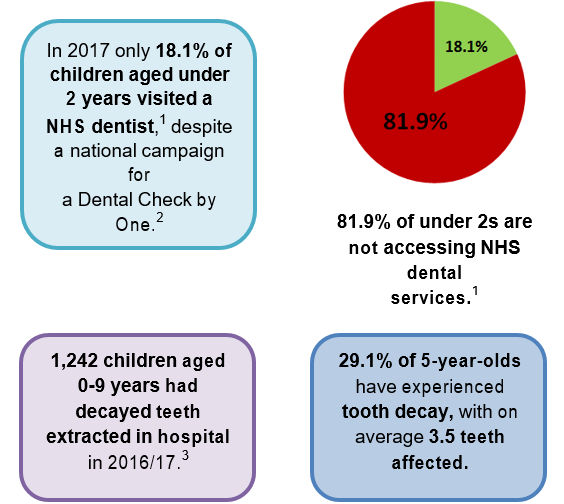
Nationally:
- A study of very young children in 2014 found 12% of 3-year olds had visible dental decay.
- A majority of decay in children if left untreated
- PHE found 24.7% of five-year olds to have tooth decay, with 3 or 4 teeth affected on average.
- On average, 3 days of school were missed due to dental problems, which also affects employed parents.
- 67% of parents have reported their child being in pain from their mouth.
- 38% of children from 0-19 years were admitted to hospital for dental extraction in 2014-2015.
- Over 63,000 children from 0-19 years were admitted to hospital for dental extraction in 2014-2015.
- Such management is costly and inefficient.
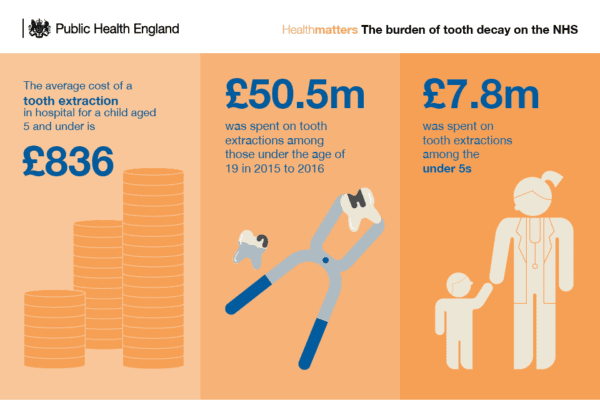
Locally:
- There is a very mixed picture of child dental health across Cheshire and Merseyside.
- 22% of 5-year olds in Cheshire West and Cheshire experience decay, whereas 43% in Knowsley do.
- Many areas have also seen an increase in the number of children demonstrating decay on their deciduous front teeth, which is linked to the use of sugary drinks in baby bottles.
- Halton, Knowsley, Liverpool and St Helens all sit within the 30 English Local Authority areas with the highest levels of dental disease at 5-year olds.
- Over the last 10 years, there has been a sustained improvement in levels of decay in Liverpool.
- There is no evidence of such a marked improvement across Cheshire and Merseyside.
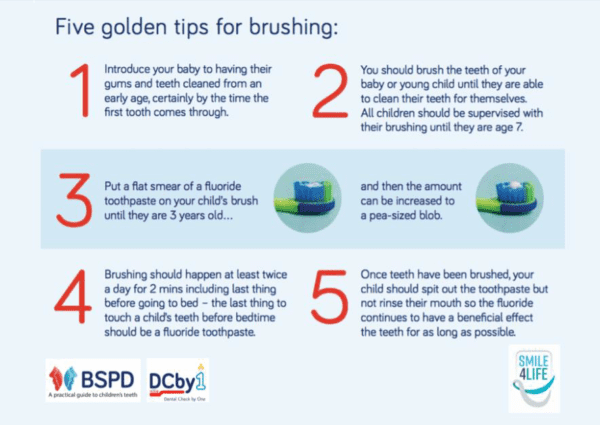
What was done to address the issue?
Background:
We were approached by the Local Pharmacy Network across Cheshire and Mersey to integrate a specific, local dental message into a nationally agreed pharmacy oral health initiative. This is taking place during National Smile Month 13th May 2019 – 13th June 2019. Currently, there is a dental campaign entitled ‘Starting Well’, which is an initiative to encourage parents and carers into taking their children (younger than 3 years of age) to visit a dentist. We felt that National Smile Month offered a substantial opportunity to increase awareness of the ‘Starting Well’, scheme across the region within a wider patient base. We have therefore sent additional child oral health resources, to be utilised as part of the National Smile Month, alongside the national documentation provided. These local resources mirror those which have been provided to the local dental practices, earlier in the year.
Primary aims:
- Develop links between primary care service providers
- Promote understanding of gold-standard oral health. messages for children and parents/carers.
- Facilitate the attendance of young children to dental practices across Cheshire and Mersey.
Key objectives:
- Gain engagement in such a project from both the Local Dental Network (LDN) and Local Pharmacy Network (LPN).
- Generate and disseminated documentation to advise and educate pharmacists on key child oral health messages.
- Advise dentists on the potential for an increase in very young children accessing care at their surgeries.
- Create and cultivate a longer-term bi-directional link between dental and pharmacy teams to promote oral health, facilitating discussion and learning from both cohorts of healthcare professionals.
Target group:
Currently there are approximately 640 NHS Pharmacies, 360 NHS general dentist practices and 4 salaried community dental services in C&M. Sixty-nine of the NHS dental practices, in localities where children have the highest levels of dental disease, are signed up specifically to the ‘Starting-Well’ initiative, which promotes enhanced skills, for managing very young patients.
Brief overview of activity to date:
1. Approached by LPN to develop a local enhanced message, to be disseminated to C&M Pharmacies.
2. Identified a key message to be delivered to pharmacies regarding paediatric oral health alongside the LDN.
3. Obtained permission to utilise specially edited, pharmacy specific, posters from the British Society of Paediatric Dentistry Dental Check Ups by 1 Campaign.
4. Approached Public Health England national team to obtain appropriate supporting documentation (Start4Life z-cards).These were chosen to ensure a homogenous message with resources used recently in other primary dental care campaigns.
5. Developed a brief educational pack for pharmacies, giving gold-standard oral health messages for children, parents and carers. Provision of the contact details for all local NHS dental practices.
6. Obtained LPN and LDN approval on the educational pack. Chairs agreed to countersign and approve message.
7. Advice sought and approval gained from Dental Senior Commissioning manager to circulate information to dental teams.
8. Dentists advised of potential increase in young children looking to access care during Smile Month/in period immediately after Smile Month.
9. Fulfilment of all resources confirmed for May 8th; one week prior to the start of Smile Month.
10. Provision in place for media campaign launch of Smile Month, to equally promote key health messages, alongside increasing awareness of the campaign.
What was the outcome of the intervention?
Brief overview of outcomes:
1. The pre-campaign has highlighted the need to improve knowledge and awareness in relation to the key programme objectives.
2. Both LDN and LPN were keen to increase engagement between the two professions.
Next steps:
- Launch of Smile Month, alongside local enhanced message.
- Support of pharmacies and dental practices during Smile Month, by utilisation of specifically trained Dental Care Champions.
- Review and feedback of campaign from both dentists and pharmacists involved with the initiative.
- Ascertain if the local initiative resulted in an increase of very young children accessing routine dental care.
- Utilise this initiative as a basis to promote links between dentists and pharmacists; for example, a learning event between dentists and pharmacists to educate both groups on wider oral health issues alongside the MECC agenda.
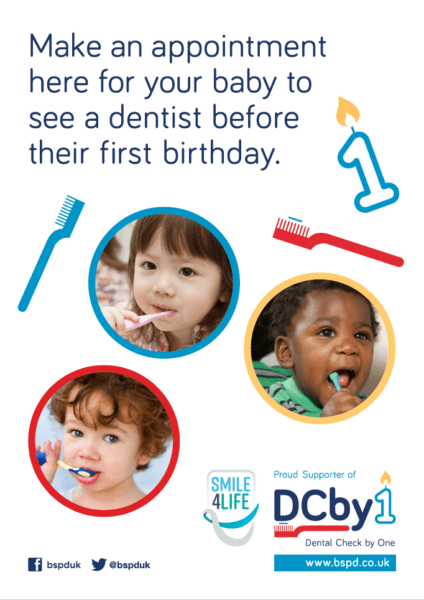
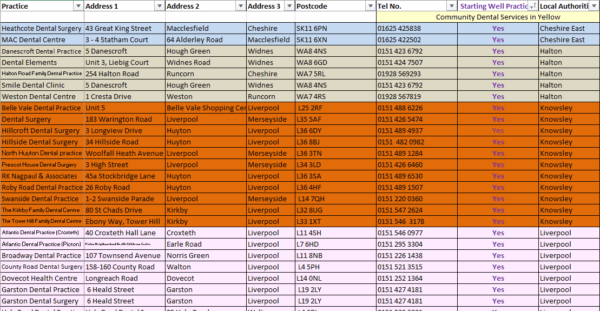
Description of the picture:
The poster provided to pharmacists to promote conversation regarding dental check-ups.
The list disseminated to Pharmacists so they can inform patients of their local Dental Practices, including those ‘Starting Well’ practices. This is organised by local authority.
For further information
Dr Yvonne Dailey, Consultant in Dental Public Health, Public Health England, e-mail: [email protected]
Ross Keat, Academic Clinical Fellow/Specialty Registrar in Dental Public Health, e-mail: [email protected]